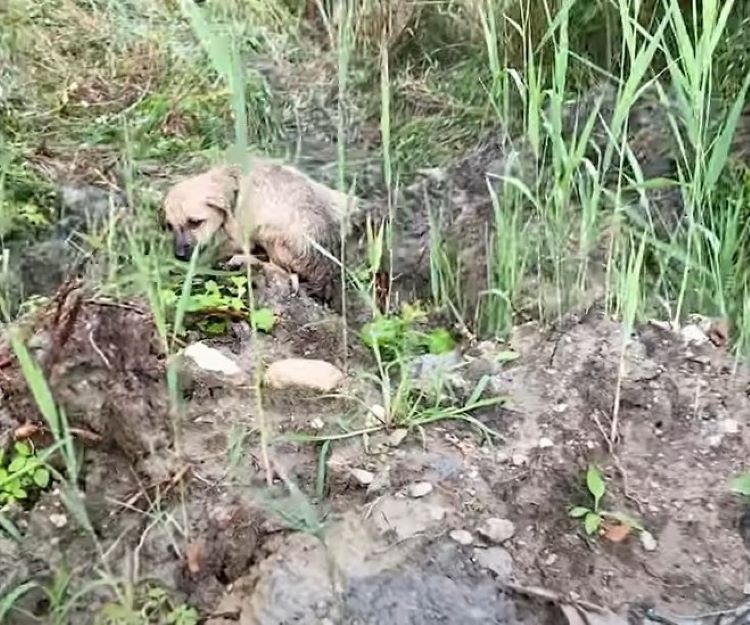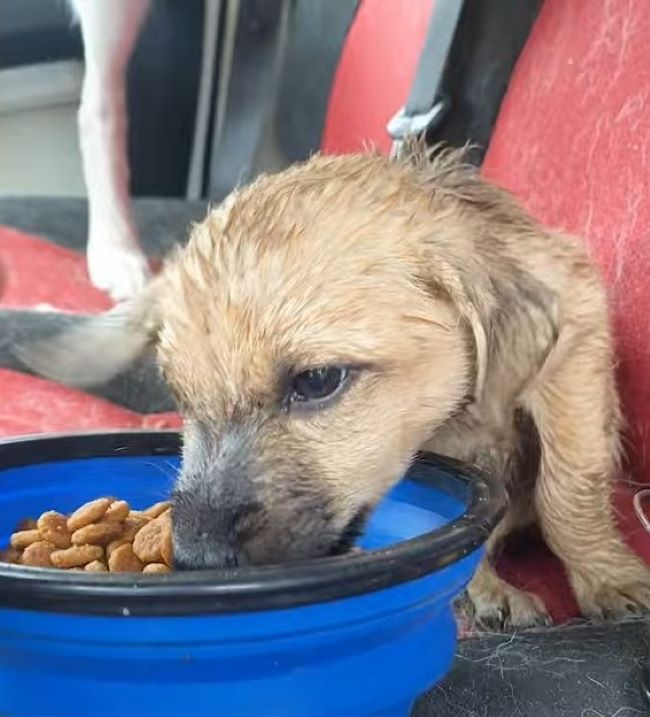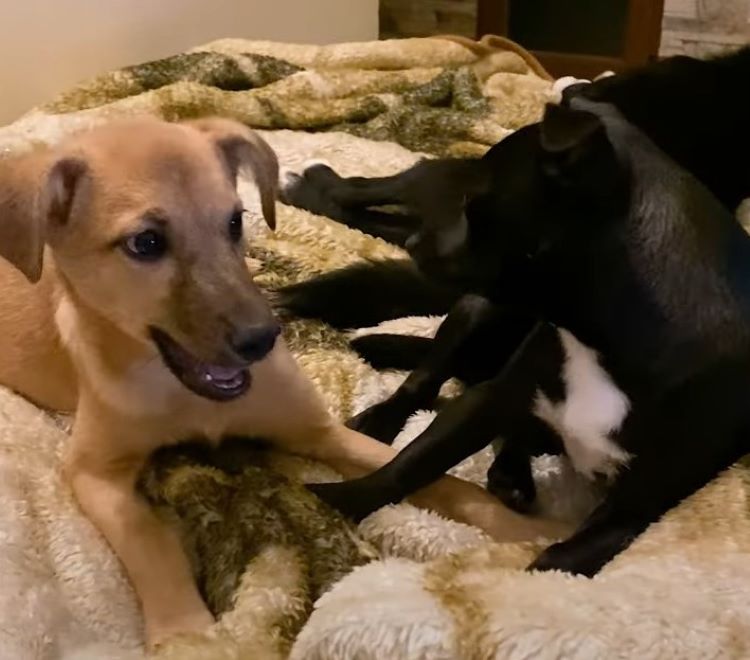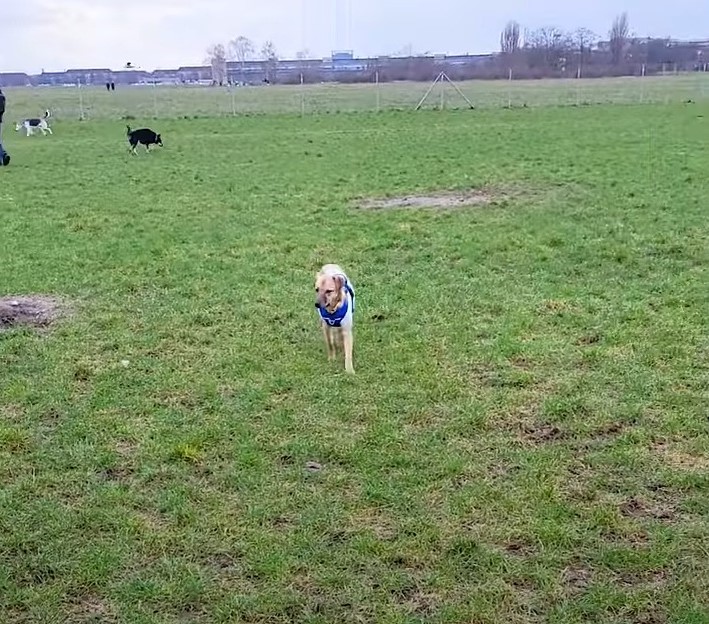I’ve always wondered how some stray dogs who grew up on the street manage to stay so warm and welcoming even though life has never cuddled them.
They’ll get treated like dirt, possibly even abused, but it’s like nothing breaks their spirit. I just wish that they didn’t have to live like that.
However, not all is doom and gloom, especially not for this puppy who was initially afraid of people but wanted their help.
He always patiently stood in the same spot for days waiting for somebody to adopt him, and then somebody amazing came to his aid.
He Didn’t Have Anybody

When a rescuer from Koda’s Mission, Yannick, was driving down the road, he noticed a stray puppy sitting in the middle of nowhere, soaking wet from the rain.
He immediately stopped his car and went outside to check on him. The puppy looked a bit scared, but he wanted help from this person.
Yannick didn’t have any idea as to how this dog ended up there or if his mom was nearby, so he checked the area out and didn’t find anybody.
It was tragic that he had to endure this much on his own, but his new rescuer was going to make sure that never happened again.
Yannick took the puppy into his car and introduced him to his dog, Koda, who very warmly accepted this sweet puppy.

After he waited a bit more to see if anybody would come for the puppy, he concluded that it was safe to take him somewhere else.
He gave him some dog food, and the puppy enjoyed his first full meal in a long time. Now that he was full, the man drove him back to his home.
The puppy was very sweet and loved the new house he was in. Yannick gave him a nice and warm bath to get rid of all the fleas.
e then helped him get dry and placed him in his new, comfortable bed. The puppy just loved every second of it and understood that this man wanted what was best for him.
Peanut Is So Friendly

After merely a few days, the puppy’s mood changed completely. He was a lot more social, and everything was an interesting experience for him.
He loved exploring the house and running around as much as he could. The pup, now named Peanut, made friends with another rescue chihuahua in the house, called Pixie.
The two were just adorable together, and they would play all the time. They were inseparable and spent every day together. It was amazing to see.
Yannick was really proud of his work after seeing just how happy the dogs were in his care, and he vowed to help out any animal he could.
After taking care of Peanut for a while, an offer came to Yannick from a woman who was interested in adopting the puppy.

She was so determined in her desire to adopt that she drove her own car to meet the dog. The woman, Dorothea, was so happy when she met Peanut.
The two of them clicked and Yannick just knew at that moment that she was the right person to be his new mom.
Even though Peanut is enjoying his life with the most wonderful person ever, Dorothea constantly updates Yannick about the puppy.
It’s really amazing to see how a puppy who suffered a lot so early in his life has managed to bounce back and is now living his best life, thanks to the help of these amazing people.
If you’ve ever found yourself wrinkling your nose at your furry friend’s less-than-pleasant odor, you’re not alone. As a seasoned dog enthusiast, you know that while dogs have a natural scent, there are times when that smell can become overwhelmingly strong. Understanding the reasons behind why your dog might smell so bad is key to keeping them fresh and clean.
From rolling in something unmentionable during a walk to skin infections or anal gland issues, there are various factors that can contribute to your dog’s less-than-ideal aroma. As someone who values a happy and healthy pup, discovering the root cause of your dog’s odor can lead to effective solutions that will have them smelling fresh and cuddle-worthy in no time.
Understanding the Common Causes of Dog Odor
Natural Scent and Breed Factors
Some dogs naturally have a stronger smell due to their breed or individual body chemistry. Breeds like Bloodhounds or Basset Hounds tend to have a distinct odor as part of their natural scent. Understanding your dog’s breed characteristics can help you accept and manage their unique smell effectively.
Skin Infections and Allergies
Skin infections and allergies can lead to unpleasant odors in dogs. Bacterial or fungal infections, as well as allergic reactions to food or environmental factors, can cause skin issues that result in a foul smell. Regular grooming, veterinary check-ups, and appropriate treatments can help address these conditions.
Yeast and Bacterial Infections
Yeast and bacterial infections, particularly in areas like the ears, paws, and skin folds, are common culprits of bad dog odor. These infections can produce a musty or foul scent. Proper hygiene, keeping these areas clean and dry, and following your vet’s recommendations for treatment are crucial in managing and preventing these infections.
Ear Conditions
Ear infections or ear mites are frequent sources of bad smells in dogs. If your dog’s ears have a strong, unpleasant odor, it could indicate an underlying issue that requires attention. Regular ear checks, cleaning with vet-approved solutions, and prompt treatment of any infections can help keep your dog’s ears healthy and odor-free.
Dental Issues and Bad Breath
Poor oral hygiene and dental problems can contribute to your dog’s bad breath, which can be a significant source of unpleasant odors. Tartar buildup, gum disease, or decaying teeth can all cause foul breath in dogs. Establishing a dental care routine, including brushing your dog’s teeth and providing dental chews, can improve their oral health and overall breath quality.
Anal Gland Problems
Anal gland issues are another common cause of dog odor. These glands, located near the anus, can become impacted or infected, leading to a distinct, strong smell. If your dog is scooting their rear on the ground or excessively licking their behind, it could indicate anal gland problems. Regular expression of the anal glands by a professional groomer or veterinarian can help prevent odor issues related to this area.
Lifestyle and Environmental Contributors
Poor Grooming and Coat Care
When you don’t groom your dog regularly, dirt, oils, and bacteria can build up on their skin and fur, leading to that unpleasant smell. Brushing your dog’s coat removes dirt and distributes natural oils, keeping their skin healthy and odor-free.
Diet and Nutrition Impacts
What your dog eats plays a significant role in how they smell. A poor diet can result in digestive issues, gas, and bad breath, all of which contribute to a foul odor. Ensure your furry friend is getting a balanced diet with high-quality ingredients to keep them smelling fresh.
Lack of Ventilation and Exercise
Stale air and lack of physical activity can exacerbate your dog’s smell. Adequate ventilation in your home helps prevent odors from lingering, while regular exercise helps maintain your dog’s overall health, reducing the likelihood of them developing a strong odor.
Wet Dog Smell After Baths or Swimming
That wet dog smell is a common occurrence after your pup gets wet. It happens when water interacts with the natural oils on their skin. To combat this smell, ensure your dog is thoroughly dried after baths or swimming to prevent that lingering odor.
Remember, by addressing these lifestyle and environmental factors, you can help keep your furry companion smelling fresh and clean.
Health-Related Concerns
Kidney or Liver Disease
When your dog’s breath or body odor becomes unusually strong or foul, it could indicate underlying health issues like kidney or liver disease. These conditions can lead to a distinct odor in your dog that may not be resolved through regular grooming. If you notice persistent bad smells despite proper care, it’s essential to consult your veterinarian for a thorough examination.
Diabetes and Other Metabolic Issues
Unpleasant odors in dogs can also stem from metabolic issues such as diabetes. Dogs with poorly managed diabetes may develop a sweet or fruity smell on their breath, signaling high blood sugar levels. Additionally, imbalances in their metabolism can manifest as abnormal body odors. Monitoring your dog’s health through routine check-ups can help detect and address these issues promptly.
Gastrointestinal Problems
Unpleasant odors emanating from your dog may indicate gastrointestinal problems, including issues with digestion or bowel movements. Flatulence, in particular, can be a common sign of digestive issues that contribute to your dog’s odor woes. Ensuring your dog has a balanced diet, regular exercise, and appropriate veterinary care can help manage gastrointestinal health and keep those undesirable smells at bay.
Solutions and Preventative Measures
Regular Grooming Routines
Keeping up with your furry friend’s grooming needs is essential in preventing bad odors. Brush your dog regularly to remove loose fur and dirt that can harbor odors. Bathing your dog with a mild dog shampoo can also help control odor. Remember to dry your dog thoroughly after baths, especially in areas prone to dampness like their ears and underbelly.
Choosing the Right Diet
What your dog eats can significantly impact how they smell. Opt for high-quality, balanced dog food that meets your pet’s nutritional needs. Avoid feeding table scraps or low-quality food that can lead to digestive issues and unpleasant odors. Additionally, ensure your dog has access to fresh water at all times to support overall health and hydration.
Proper Dental Hygiene
Don’t overlook your dog’s dental care when tackling bad smells. Regularly brushing your dog’s teeth and providing dental chews can help prevent dental problems that contribute to foul breath. Dental issues like tartar buildup and gum disease can not only cause bad breath but also indicate underlying health concerns that need attention.
Seeking Veterinary Care for Health Issues
If your dog continues to have persistent bad odors despite your best efforts, it’s crucial to consult a veterinarian. Health issues like skin infections, dental problems, or underlying medical conditions could be the culprits. A vet can diagnose and treat any health issues causing the odor, ensuring your dog stays healthy and fresh-smelling.
Remember, maintaining a proactive approach to your dog’s grooming, diet, dental care, and overall health is key to addressing and preventing unpleasant odors. By staying attentive to your furry companion’s needs and seeking professional care when needed, you can enjoy a fresh-smelling and happy dog by your side.
Conclusion
So, there you have it – a smelly dog doesn’t have to be the norm. By staying on top of grooming, watching out for any health issues, and feeding your pup a balanced diet, you can keep that stinky dog smell at bay. Remember, a little care goes a long way in keeping your furry friend fresh and happy. Just a few simple steps can make a world of difference in ensuring your dog is a joy to be around. So, don’t let the stench linger – take action and enjoy the sweet smell of a clean and healthy pup!
Frequently Asked Questions
Q: What are some common causes of unpleasant odors in dogs?
A: Unpleasant odors in dogs can be caused by breed characteristics, skin infections, diet, kidney or liver disease, diabetes, and gastrointestinal issues.
Q: How can I manage foul odors in my dog?
A: To manage foul odors in your dog, prioritize grooming, veterinary care, a balanced diet, and exercise. These help tackle underlying health issues contributing to the smell.
Q: What preventative measures can I take to keep my dog smelling fresh?
A: To keep your dog smelling fresh, maintain regular grooming routines, opt for a suitable diet, ensure proper dental hygiene, and promptly address persistent bad odors with your vet.
[no_toc]

Hey there, I’m Janet Brooks, a dog-loving student from California. I’m all about helping pups in need, especially those without homes. Me and my awesome friends work together to give shelter and love to stray dogs. Oh, and I also write blogs about dogs to share helpful info.